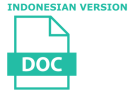Tingkat Tutur Pengisi Fungsi Subjek Bahasa Korea dan Bahasa Jawa
Iva Hanani(1*), Suray Agung Nugroho(2)
(1) Universitas Gadjah Mada
(2) Universitas Gadjah Mada
(*) Corresponding Author
Abstract
The aim of this study is to explain Korean and Javanese subject honorific and identify its similarities and differences. To accomplish it, this research was conducted using literature review method. Data related to the Javanese language were taken from two Javanese drama scripts, namely Mak Ana Asu Mlebu Ngomah and Bantul Sangsaya Pinunjul, and Javanese drama titled Sri Ngilang by George Quinn. Korean language data was taken from television drama, Misaeng and Fight for My Way. Based on the analysis that has been carried out, despite the difference of the honorific system of Korean dan Javanese, Javanese has subject honorific as described in the Korean honorific system. Both languages use words that have honorific meaning to honor the subject and use words that are usually used for the animal to dishonor the subject of the sentence. The difference between both languages on subject honorific is Korean subject honorific is mainly realized grammatically, whereas in Javanese is realized lexically. In addition, there are rules from the Korean government regarding the use of one type of subject honorific, abjonbeob, whereas in Javanese there are no rules related to the use of speech level.
Keywords
Full Text:
PDFReferences
Abidan, A. (2011). Bantul Sangsaya Pinunjul. Balai Bahasa.
Brown, P., Levinson, S.C. (1996). Politeness, Some Universals in Language Usage. Cambridge University Press.
Digital Learning Project. (2014). Sri Ngilang - "The Disappearance of Sri" - A play in Javanese. Diakses pada 3 Agustus 2019, 20:43 WIB dari https://www.youtube.com/watch?v=uTL6BMG8JZ0&t=1039s
Han, G. (2002). A Study of the Honorifics of Contemporary Korean. Youngrak.
Indrayanto, B., Yuliastuti, K. (2015). Fenomena Tingkat Tutur dalam Bahasa Jawa Akibat Tingkat Sosial Masyarakat. Magistra, 91, 37-44.
Kim, U. S. (2000). A Historical Study of Lexical Honorifications in Korean. Korean Linguistic, 11, 185-212.
_________. (2016). Language and its Components. Seoul: Hankuk Munhwasa.
Koo, H. J. (2004). A Cognitive Analysis of Lexicalization Patterns of (Dis-) Honorification in Korean. Korean Semantics, 14, 97-120.
Lee, J. T. (2016). Linguistic Norms about Korean Apjonbeop and Linguistic Reality. Inmunnonchong, 30, 37-47.
________. (2016). The Change of Korean Honorific Category’s Nature and “Apjonbeob”. Munbeob Gyoyuk, 28, 165-181.
Lee, S. Y. (2015). A Study on the Concept of Slang, Vulgar Words, and Swearing in Korean. The Journal of Language & Literature, 64, 59-80.
Lee, Y.H. (2001). A Study on Politeness in Contemporary Korean. Yeonrak Publisher.
National Institute of Korean Language. (1992). South Korean Standard Speech Handbook (Pyojun Hwabeob Haeseol). National Institute of Korean Language.
National Institute of Korean Language. (2011). Standard Linguistic Manners (Pyojun Eoneo Yejeol). National Institute of Korean Language.
Poedjasoedarma, S. (1979). Tingkat Tutur Bahasa Jawa. Departemen Pendidikan dan Kebudayaan.
Rahayuning, W. N. (2018). A Contrastive Study of Korean and Javanese Relative Honorific. Unpublished thesis. Kyunghee University.
Robson, S.O. (1987). The Terminology of Javanes Kinship. Journal of the Humanities and Social Sciences of Southeast Asia and Oceania 143, 507-518.
Wahyudi, A. S. (2014). Mak Ana Asu Mlebu Ngomah. Garudhawaca.
Wijana, I. D. P. (2008). Kata-Kata Kasar dalam Bahasa Jawa. Humaniora, 3, 249-256.
Article Metrics
Refbacks
- There are currently no refbacks.
Copyright (c) 2020 The Author(s)

This work is licensed under a Creative Commons Attribution-ShareAlike 4.0 International License.







